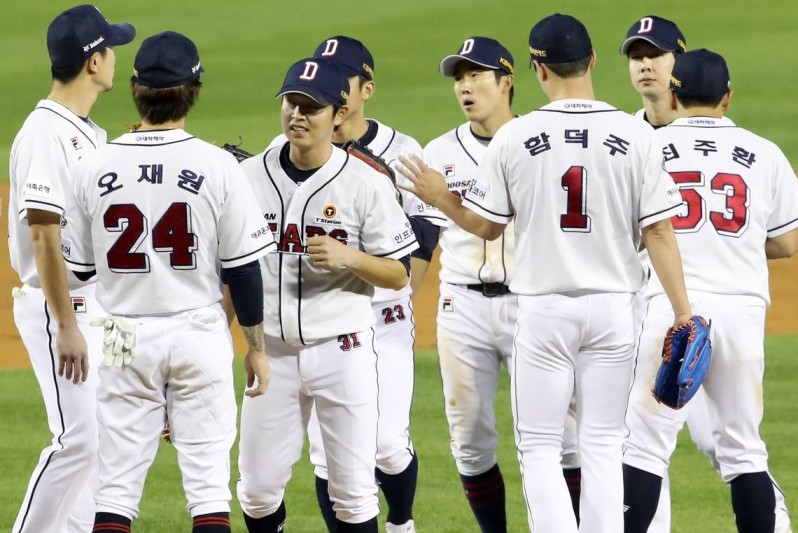Korea Baseball Organization (KBO) is a captivating cultural phenomenon, enchanting fans with thrilling games, a passionate community, and vibrant energy. Discover its rich history, legendary players, and the unique playing style that appeals globally. Learn how KBO has shaped South Korean culture and serves as a significant talent hub for Major League Baseball, drawing international attention to its exceptional players and electrifying fan traditions.
The Korea Baseball Organization: Unraveling Its Global Appeal and Cultural Impact

The Korea Baseball Organization, often referred to as the KBO, is more than just a sports league; it’s a cultural phenomenon that captivates millions, much like major league baseball has captivated global audiences for decades. As baseball fans around the globe seek thrilling games and unforgettable moments, the KBO delivers with its unique flair and passionate fan base. From powerful home runs to strategic plays, this league showcases the very essence of baseball, similar to the thrilling displays often seen in the nippon professional baseball league.
We find ourselves drawn to the vibrant energy that defines the KBO. It’s not just the games that keep us coming back, but the electric atmosphere and the sense of community it fosters. With a history rich in memorable matches and legendary players, the KBO has cemented its place in the hearts of fans both in Korea and internationally.
As we explore the KBO, we’ll uncover why it’s become a beloved part of Korean culture and a must-watch for baseball enthusiasts everywhere.
Key Takeaways
- The Korea Baseball Organization (KBO) is a significant cultural and sports phenomenon in South Korea, embodying thrilling baseball and a passionate fan base.
- Founded in 1981, the KBO has grown from six teams to an influential league with a rich history of strategic plays and memorable matches.
- The KBO League comprises 10 teams, featuring a competitive season format with 144 games per team, culminating in the Korea Series postseason for the top five, much like the intense playoffs seen in the dominican professional baseball league.
- Notable players like Lee Seung-yuop and Chan Ho Park, along with dominant teams such as the Doosan Bears and Kia Tigers, have contributed to the KBO’s legacy and global recognition.
- The KBO’s cultural impact extends beyond sports, influencing national identity and global baseball through international talent exchanges and a strong broadcasting presence, reflecting similar influences seen in the roberto clemente professional baseball league.
- Looking ahead, the KBO aims to overcome challenges and seize opportunities through rule changes, expansion, and development plans, ensuring its status as a leading baseball league.
History Of The Korea Baseball Organization
The Korea Baseball Organization, known as KBO, is a cornerstone of professional baseball in South Korea. It boasts a remarkable history that continues to engage millions.
| Year/Event | Description |
|---|---|
| 1981 | KBO established as the Korea Professional Baseball Committee (KPBC). |
| 1982 | Inaugural KBO season begins with six founding teams. |
| 1982 | First KBO game played on March 27; OB Bears claim the first championship. |
| 2000s | Rise of foreign players and increased international interest in the KBO. |
The Inception And Growth
The Korea Baseball Organization (KBO) started as the Korea Professional Baseball Committee (KPBC) on December 11, 1981. The transformation into KBO occurred during the first club owners’ meeting on January 15, 1982. The league began with six teams: OB Bears, Samsung Lions, Lotte Giants, MBC Blue Dragons, Haitai Tigers, and Sammi Super Stars, reflecting a strong foundation for professional baseball.
Key Milestones In The League
The inaugural KBO season kicked off in 1982, marking a historic moment for baseball in South Korea, comparable to the milestone beginnings of the mexican baseball league. The first-ever game was on March 27, 1982, at Dongdaemun Baseball Stadium in Seoul, where MBC Chungyong defeated Samsung Lions 11-7. The OB Bears claimed the first championship title, setting a precedent for future competitions. Over the years, KBO has grown, evolving into a significant sports league with a fervent following.
Structure Of The League
The Korea Baseball Organization (KBO) serves as the primary authority for professional baseball in South Korea. It manages two main leagues: the KBO League and the KBO Futures League.
| Component | Details |
|---|---|
| Total Teams | 10 teams |
| Regular Season | 144 games per team from March to October |
| Postseason | Top 5 teams advance to the playoffs, culminating in the Korea Series |
| Notable Teams | Doosan Bears, Kia Tigers, Samsung Lions |
Teams And Divisions
The KBO League comprises 10 teams, originating from the six founding franchises of 1982. These teams include the Doosan Bears, Hanwha Eagles, Kia Tigers, Kiwoom Heroes, KT Wiz, LG Twins, Lotte Giants, NC Dinos, and Samsung Lions. The SK Wyverns have been replaced by the SSG Landers, a change not reflected in all sources but notable for maintaining historical context.
Season Format And Schedule
Every KBO season consists of a robust schedule designed to highlight competitive play. The regular season features 144 games per team, running from March to October. The top five teams enter the postseason, culminating in the Korea Series. This playoff structure emphasizes consistent performance and rewards teams with both skill and strategy, fitting for a league with such a rich history.
Notable Players And Teams
The Korea Baseball Organization (KBO) has produced a wealth of talent, achieving international acclaim from notable players and dominant teams that have shaped the league’s legacy. We look at some standout figures and franchises that have left a lasting impact.
| Player/Team | Achievements and Contributions |
|---|---|
| Lee Seung-yuop | Holds league records for home runs, RBIs, and total bases; 5-time MVP and 4-time Korea Series champion. |
| Chan Ho Park | First Korean-born MLB player; KBO and MLB success showcased his talent internationally. |
| Doosan Bears | Consistent playoff appearances and multiple Korea Series victories highlight their dominance. |
| Kia Tigers | Most decorated KBO team with numerous championships, showcasing strong player development. |
Legendary Players
Lee Seung-yuop stands as one of KBO’s greatest players. Lee holds the league records for home runs, RBIs, runs, and total bases. His impressive career includes five KBO MVP Awards and four Korean Series championships, demonstrating his influential presence. Chan Ho Park, the first Korean-born Major League Baseball player, enjoyed success in both the KBO and MLB. Park’s All-Star selection in 2001 and his tenure with teams like the Los Angeles Dodgers and Texas Rangers underline his versatility and skill. Seung-hwan Oh, renowned for his career in saves, is the all-time KBO leader with 370 saves. Oh, a five-time Korean Series champion, also played in Japan’s Nippon Professional Baseball and the MLB for teams such as the St. Louis Cardinals and Toronto Blue Jays, showcasing his global impact.
Dominant Teams
The Doosan Bears exemplify a powerhouse team in the KBO, consistently performing well in the league and making numerous Korea Series appearances. Their ability to develop talent and execute strategic play cements their reputation as a dominant force. The Kia Tigers boast a strong record too, with numerous Korean Series championships. Their success is a testament to their strategic acumen and strong player development. As the most decorated team, the Tigers continue to be a formidable contender. The Samsung Lions have also maintained a high level of performance, winning several series titles and showcasing consistency over the years. Their sustained success signals their effective management and robust team dynamics in the ever-competitive KBO League.
Cultural Impact Of The KBO
The Korea Baseball Organization (KBO) has profoundly shaped South Korean culture since its 1982 debut. Its influence extends beyond sports, affecting national identity and societal values.
| Aspect | Description |
|---|---|
| Cultural Impact | Integral to South Korean identity, fostering family traditions, regional pride, and national unity. |
| Influence on Global Baseball | Talent pipeline to MLB, showcasing KBO players on international stages and fostering cross-cultural respect. |
| Broadcasting | Extensive coverage on pay TV and streaming services, making games widely accessible. |
| Future Initiatives | Plans include rule changes like the Automated Ball-Strike System (ABS), expansion efforts, and youth development programs. |
Popularity in South Korea
The KBO has become a fixture of South Korean culture, offering more than just entertainment. Families and friends regularly gather to watch games, fostering both tradition and connection. National pride continues to grow as the KBO represents one of the country’s prestigious sports leagues.
Regional rivalries within the league have heightened its appeal, often inciting vigorous local support. Games featuring teams like the Doosan Bears and Kia Tigers exemplify these inter-regional tensions, engaging communities while reinforcing local identities.
Influence on Global Baseball
Although the KBO primarily impacts South Korea, its effects are felt worldwide. The league has become a talent pipeline for Major League Baseball (MLB), offering a stage for players like Chan Ho Park, who transitioned successfully to MLB after showcasing talent in the KBO.
Social norms and values are also reflected in the KBO, with the league promoting respect, sportsmanship, and dedication. International fans, captivated by this ethos, view the KBO not just as a league but as a reflection of Korean cultural values. Global interest in the KBO has increased, inspired by its unique playing style and passionate fan base.
The KBO And International Talent
The Korea Baseball Organization (KBO) has become a notable platform for international talent. Integrating foreign players strengthens the competitive nature and appeal of the league.
Foreign Players In The League
The KBO League saw a significant rise in foreign players especially since the early 2000s. This influx of talent introduced new training techniques, enhancing the skills of local players. Notably, Korean pitchers began incorporating weight training to improve speed and spin rate. Over a decade, the average pitching velocity in the KBO increased from approximately 85 mph to around 89 mph. These adaptations have not only benefited individual athletes but have elevated the overall performance and strategies of KBO teams.
KBO Players Transitioning To MLB
Several KBO players have successfully transitioned to Major League Baseball (MLB). Chan Ho Park, the first Korean-born MLB player, set a precedent for others to follow. These transitions highlight the quality of talent nurtured in the KBO, further linking the KBO with global baseball networks and attracting international scouts. KBO’s role as a talent pipeline for MLB continues to grow, showcasing the league’s capacity to produce world-class baseball players.
Broadcasting And Fan Engagement
The Korea Baseball Organization (KBO) boasts a comprehensive broadcasting framework that connects to millions daily, cementing its role as a cultural pillar.
Television And Online Streaming
Since 2008, the KBO has established a unique television broadcasting structure. Almost all matches are televised nationally via pay TV sport channels, with the KBO mandating that these channels air at least 95% of total games. This ensures extensive coverage, with Korea’s three terrestrial channels airing a minimum of 10 matches annually. The high penetration of pay TV in Korea, with basic packages costing around only $20 USD monthly, makes these broadcasts accessible to a large audience.
In the past few years, Korean streaming services have increasingly acquired exclusive rights to KBO games. This marks a shift from free to subscription-based models, allowing viewers to enjoy games online, enhancing their viewing experience.
Fan Culture And Traditions
KBO’s fan culture is defined by its vibrant traditions and passionate supporters. Cheering squads, coordinated chants, and unique team-specific rituals create an electric atmosphere at games. Fans often engage in synchronized cheers and performances, fostering community spirit and camaraderie.
Additionally, fans uphold traditions such as wearing team colors, displaying banners, and engaging in online forums to discuss game strategies and player performances. These practices contribute to a lively and engaged fan base, further solidifying the KBO’s presence in South Korean culture.
Future Of The Korea Baseball Organization
The Korea Baseball Organization (KBO) is poised for a transformative future. As a central pillar of South Korean cultural and sports identity, it’s crucial that the KBO adapts to modern challenges and opportunities.
Challenges And Opportunities
Several upcoming rule changes aim to enhance gameplay and align the KBO with global standards. Implementing the Automated Ball-Strike System (ABS) improves precision in umpiring. Larger bases provide player safety and might increase base stealing, encouraging more dynamic plays. However, these changes come amid challenges. Recent setbacks in international competitions, like the World Baseball Classic, highlight the need to boost the competitiveness of our national team. Adapting to rule changes offers opportunities for innovation but demands strategic planning to maintain our teams’ standings on the world stage.
Expansion And Development Plans
The KBO continues exploring expansion and development initiatives to secure its future. Plans may include establishing new teams to enhance the league’s reach and fan engagement. Meanwhile, development focuses on nurturing young talent, with efforts to integrate cutting-edge training techniques and adopt new playing strategies. Investment in youth academies and international talent scouting networks propels this growth. Incorporating these elements further cements the KBO’s status as a leading baseball league and ensures sustained success.
Conclusion
The Korea Baseball Organization stands as a testament to the enduring appeal of baseball, weaving itself into the cultural fabric of South Korea and beyond. Its rich history, vibrant fan culture, and strategic gameplay have not only captivated local audiences but also drawn global attention. As the KBO continues to evolve, embracing new technologies and expanding its reach, it remains a beacon of sportsmanship and community spirit. We’re excited to see how the league will adapt and thrive in the coming years, maintaining its legacy as a powerhouse in the world of baseball.
Frequently Asked Questions
What is the Korea Baseball Organization (KBO)?
The Korea Baseball Organization (KBO) is the premier professional baseball league in South Korea. Established in 1982, it features ten teams and is renowned for its thrilling games, passionate fan base, and cultural significance in Korean society. The league is known for its vibrant atmosphere and has a strong historical legacy, making it a beloved part of Korean culture and an attractive spectacle for global baseball enthusiasts.
How did the KBO begin?
The KBO began as the Korea Professional Baseball Committee (KPBC) on December 11, 1981. It was officially launched as the KBO in January 1982. The league started with six teams, playing its inaugural game on March 27, 1982, at Dongdaemun Baseball Stadium. The OB Bears won the first championship that year, marking a milestone in the league’s development and growth as a major sporting event in South Korea.
How is the KBO structured?
The KBO is the main governing body for professional baseball in South Korea, overseeing two main leagues: the KBO League and the KBO Futures League. The KBO League consists of ten teams, each playing a 144-game schedule from March to October. The top five teams advance to the postseason, culminating in the Korea Series. This structure emphasizes consistent performance and strategic play throughout the season.
Who are some legendary players in the KBO?
Notable legendary players in the KBO include Lee Seung-yuop, known for holding multiple league records and MVP awards, and Chan Ho Park, the first Korean-born player to join Major League Baseball (MLB). Their contributions have significantly shaped the league’s legacy, showcasing the depth of talent the KBO possesses, and have played a pivotal role in elevating the league’s reputation on a global scale.
How has the KBO impacted South Korean culture?
The KBO significantly influences South Korean culture by embedding itself into the national identity and societal values since its inception. It fosters family traditions and community connections through game attendance and passionate support. Regional rivalries and team pride further enrich local support. Moreover, the KBO serves as a talent pipeline for MLB, expanding its cultural impact and attracting international fans to its unique playing style and atmosphere.
What role do foreign players play in the KBO?
Foreign players have notably contributed to the competitive nature of the KBO, especially since the early 2000s. Their presence has introduced new techniques, improving the skills of local players and enhancing league quality. Successful transitions of KBO players to MLB, like Chan Ho Park, showcase the international talent nurtured in the KBO. This highlights the league’s growing global influence and its role as a producer of world-class baseball talent.
How are KBO games broadcasted?
Since 2008, the KBO has developed a unique broadcasting framework, offering extensive coverage of games on pay TV and streaming services. This comprehensive approach connects millions of fans daily, reinforcing the KBO’s role as a cultural mainstay in South Korea. The vibrant traditions and cheering squads at games enhance fan engagement and community spirit, further solidifying the KBO’s prominence in South Korean culture.
What are the future prospects for the KBO?
The KBO faces opportunities and challenges in its future, such as adapting to modern advancements like the Automated Ball-Strike System (ABS) and larger bases. The league is aiming to improve national team competitiveness and is exploring expansion initiatives, including investment in youth academies and potential new teams. These efforts are crucial for sustaining the KBO’s status as a leading baseball league and ensuring continued success.


